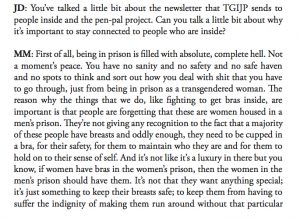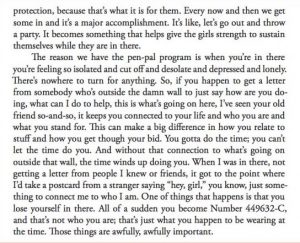The Transgender, Gender Variant, Intersex Justice Project is an organization that works to support trans people—particularly black and brown trans women and trans femmes—who are in prison or formerly incarcerated.

Miss Major, former executive director of TGIJP, is a “black, formerly incarcerated MTF transgender elder. A veteran activist born and raised on the south side of Chicago, she participated in the Stonewall rebellion in 1969 and was politicized in the wake of the Attica prison rebellion. She has worked at HIV/AIDS organizations throughout California, was an original member of the first all-transgender gospel choir, and is a father, mother, grandmother, and grandfather to her own children and to many in the transgender community” (Donahue, interview for Captive Genders, 268).
In an interview, Miss Major describes how TGIJP is a collective in which the legal team, grassroots fundraising team, and “the person that helps with grants and does that kind of annoying stuff that you have to do to survive” work together to do what needs to get done.
She goes on to describe more:
A snippet of an interview with Miss Major, conducted by Jayden Donahue, from Captive Genders: Transgender Embodiment and the Prison Industrial Complex.
Miss Major’s discussion of TGIJP and why they have the programs they do lays bare the importance of care networks in the face of insidious forces.
A central operating tenet of the prison industrial complex is that people can be displaced and disenfranchised via human warehousing. That is to say, the PIC seeks to make some people disappear.
And, as Major points out, to be a transgender woman or transfemme person inside a prison is to be marked as different in way that is particularly dangerous. So, what does it mean for people to maintain healing human connections in a context geared at destroying one’s sense of self?

